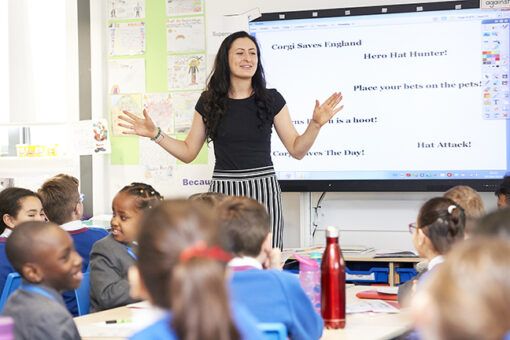

Meet the Curriculum Creator is a four-part series of chats with some of the educators working on Ark Curriculum Partnerships (ACP). Throughout the month, we will introduce you to our heads of English, music, science and maths.
ACP delivers curriculum programmes that include subject-specific professional development for teachers for use in Ark’s network of schools and beyond. The curriculum programmes are built on evidence-based research and designed by teachers and education experts to ensure students are given the best foundations and can build a cumulative understanding in each subject to enable them to reach their potential.
Nick Wallace, who is the interim Director of English Mastery, has spent his career working in the public and charity sectors. Since graduating from Oxford University with a degree in English, he has worked for an organisation that specialises in delivering GCSE intervention for at-risk students, in adult social care for Essex County Council, and taught in a challenging inner-London school. He has also been a governor for a school in Hastings. Nick has worked for English Mastery since he joined as a curriculum writer when the programme first launched in seven Ark schools in 2014.
What is your position and what do you do?
I am the Interim Director of English Mastery. I oversee all the exciting new developments we’re working on in English Mastery (like our primary and key stage 4 programmes), and also work with the school development team to help all of our lucky partner schools to implement the curriculum in their own schools.
Talk us through English Mastery and its aims.
English Mastery works in partnership with 140 secondary schools in England (and one in Northern Ireland).
We work with English departments to help them introduce a knowledge-rich approach to teaching English, which includes studying texts that have changed the world and mastering the fundamentals of writing. We hope that our comprehensive programme equips students with the knowledge and skills they need to begin their GCSE studies. You’ve also probably seen that Ofsted has launched a new inspection framework that places greater emphasis on curriculum: ‘the very substance of education’. We think that this focus is long overdue: it’s important for schools to think carefully about what students learn and experience during the precious school years. We hope we can support schools and teachers in their approaches to ensuring their students experience a brilliant English curriculum.
Why is English so important and how does it help people in their everyday life?
There are far too many reasons to list! I think I will simply quote Alan Bennett on the unique power that reading and literature has to deeply connect with people: “The best moments in reading are when you come across something – a thought, a feeling, a way of looking at things – which you had thought special and particular to you. Now here it is, set down by someone else, a person you have never met, someone even who is long dead. And it is as if a hand has come out and taken yours.”
In your opinion, what is the one book every person should read?
This is probably the cruellest question you could ever ask an English teacher! I would probably say ‘To Kill a Mockingbird’. It really does have it all: a plucky narrator, a brilliant hero, adversity, strength, humour, everything. The sequence where Atticus tells Jem and Scout that the cantankerous old lady Mrs Dubose wanted to die free from her morphine addiction gets me every time.
What is your advice to students who find English hard?
It is hard and it’s ok to find it hard! And when you read, write, talk, and argue about texts and ideas that challenge you, you’ll learn so much more about the world, what it means to live and feel, and about your own self than you ever thought you could.
Find out more about the programme here.